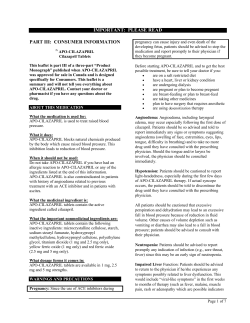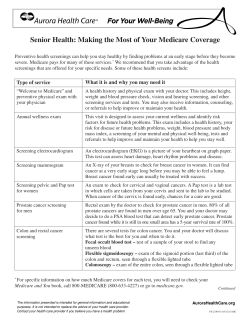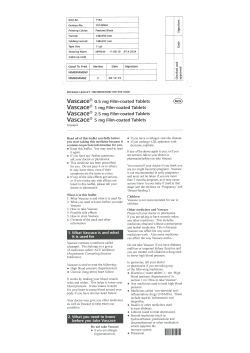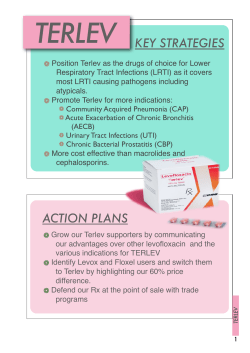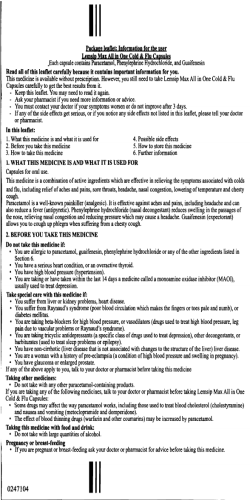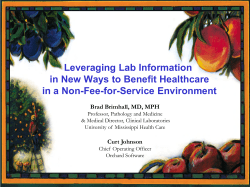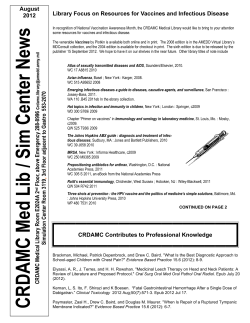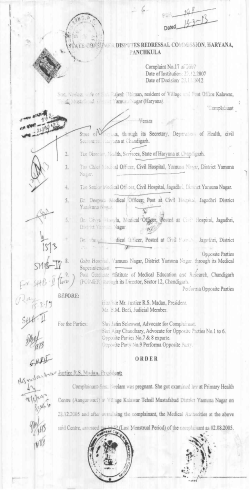
Preventive health guidelines As of May 2014 please see anthem.com/ca.
Preventive health guidelines As of May 2014 To learn more about your plan, please see anthem.com/ca. What is your plan for better health? To learn more about vaccines, please see the Centers for Disease Control and Prevention (CDC) website: cdc.gov. Make this year your best year for wellness. Your health plan may help pay for tests to find disease early and routine wellness exams to help you and your family stay well. Talk with your doctor (health care provider) about the care that is right for you. Your plan may not pay for all services and treatments in this guide. To learn more about what your plan pays for, see your certificate of coverage or call the Customer Care number on your ID card. You also can check anthem.com/ca to learn about health topics from child care to zinc. The content in this guide is based in part on suggestions from these independent groups and based on state-specific requirements: AAFP – American Academy of Family Physicians }} AAP – American Academy of Pediatrics }} ACIP – Advisory Committee on Immunization Practices }} ACOG – American College of Obstetrics and Gynecology }} ACS – American Cancer Society }} ATP III/NCEP – Adult Treatment Panel III/National Cholesterol Education Program }} CDC – Centers for Disease Control and Prevention }} USPSTF – U.S. Preventive Services Task Force }} This guide is just for your information; it is not meant to take the place of medical care or advice. Use this guide to know when to set up visits with your doctor for you and your children. Ask your doctor which exams, tests and vaccines are right for you, when you should get them and how often. How you get certain diseases is not talked about in this guide. Please see your plan handbook to check on your plan benefits. Anthem Blue Cross is a Health plan with a federal contract. Anthem Blue Cross is the trade name of Blue Cross of California. Anthem Blue Cross and Anthem Blue Cross Life and Health Insurance Company are independent licensees of the Blue Cross Association. ANTHEM is a registered trademark of Anthem Insurance Companies, Inc. The Blue Cross name and symbol are registered marks of the Blue Cross Association. Y0071_13_17086_I 02/14 17112CAMENABC Rev. 02/14 Well-baby and child screenings Well-baby exam – birth to 2 years* Well-child exam – ages 11 to 18 years* Infants who leave the hospital less than two days (48 hours) after birth need to be seen by a doctor within two to four days after being born. You might talk to the doctor if you are a first-time parent, are having a high-risk pregnancy, or want to learn about feeding, circumcision or well-baby care. At the well-baby exam you may get advice on your child’s safety, health, healthy eating and development. At these exams, your baby may get vaccines, these screenings or added screenings, such as tuberculin and/or sickle cell anemia testing, if appropriate. The doctor may talk to you about health and wellness issues. These include healthy eating, exercise, healthy weight, sexual health, how to prevent injuries, alcohol and drugs, counseling to reduce the risks of getting skin cancer, avoiding tobacco, secondhand smoke, dental health and mental health. At these exams, your child may get vaccines and these screenings, or added screenings such as tuberculin and urine testing, if appropriate. Age (in months) Screenings birth 1 2 4 6 Weight, length and head circumference (the length around the head) Newborn metabolic, sickle cell and thyroid screening 9 Screenings 12 15 18 24 at each visit birth to 2 months Development and behavior at each visit Hearing as a newborn and when your doctor suggests Oral/dental health at each visit Lead testing (unless you are sure the child has not been around lead) at 12 11 12 13 14 15 Height, weight, BMI** each year Development and behavior each year Blood pressure each year Vision each year Hearing each year Oral/dental health each year Chlamydia once between 9 and 12 Hemoglobin or hematocrit (blood count) Age (in years) 16 17 for sexually active women aged 25 and younger at 24 Autism at 18 at 24 Well-child exam – ages 21/2 to 10 years* You may get advice about how to keep your child safe, how to prevent injuries, counseling to reduce the risks of getting skin cancer, good health, healthy eating and development. Annual dental referrals starting at age three (3) or earlier, if needed. At these well-child exams, your child may get vaccines, these screenings or added screenings such as tuberculin and urine testing, if appropriate. Age (in years) Screenings Height, weight, body mass index (BMI)** Development and behavior 21/2 3 4 5 6 at each visit each year Hearing each year Blood pressure 8 9 10 each year Vision Oral/dental health 7 each year each year starting at 3 years *This guide is for people enrolled in the Anthem plan. Talk to your doctor if you have concerns about your health. **Height and weight is used to find BMI. BMI is used to see if a person has the right weight for height, or is under or over weight for height. 18 Adult screenings – women* Well-person exam The doctor may talk with you about health and wellness issues. These include healthy eating, exercise, family planning for ages 19-39 and folic acid for women who are of the age to get pregnant, sexual behavior and screening for sexually transmitted diseases including HIV, intimate partner violence, how to prevent injuries, counseling to reduce the risks of getting skin cancer, special risks you might have for cancer (such as family history) and steps you can take to manage any such risks, misuse of drugs and alcohol, how to stop using tobacco, secondhand smoke, dental health and mental health. At this visit, you may get vaccines and these screenings: Screenings 19-21 21-29 30 35 40 45 50 55 Height, weight each year or as your doctor suggests BMI each year or as your doctor suggests Blood pressure each year or as your doctor suggests Breast cancer: doctor exam each year from age 40 to 65+ every 3 years Cervical cancer: ages 30-65 Should have a Pap test plus an HPV test (called “co-testing”) every 5 years. This is the preferred approach, but it is also OK to have a Pap test alone every 3 years. Stop screening at age 65 if last three Pap tests or last two co-tests (Pap plus HPV) within the previous 10 years were normal. If there is a history of an abnormal Pap test within the past 20 years, discuss continued screening with your doctor. At age 50, your doctor may suggest one of these test options: 1.Fecal occult blood test (FOBT) each year 2.Flexible sigmoidoscopy every 5 years 3.Both #1 and #2 4.Double-contrast barium enema every 5 years 5.Colonoscopy every 10 years 6.CT colonography may take the place of a colonoscopy in some cases Cervical cancer: ages 65+ Colorectal cancer Chlamydia Cholesterol 65 and older each year from age 40 to 65+ every 1 to 3 years Breast cancer: mammogram Cervical Cancer: ages 21-29 60 sexually active women ages 25 and younger every 5 years starting at age 20 with more screenings as your doctor suggests Osteoporosis Hepatitis C *This guide is for people enrolled in the Anthem plan. Some people may be at higher risk for health issues due to their family history, their race or ethnicity, or other reasons. Talk to your doctor if you have concerns about your health. The test to check how dense your bones are should start no later than age 65; women at menopause should talk to their doctor about osteoporosis and have the test when at risk. screen once if born between 1945-1965 Pregnant women* Pregnant women should see their doctor or OB/GYN in their first three months of pregnancy for a first visit and to set up a prenatal care plan. At this visit your doctor will check your health and the health of your baby. Based on your past health, your doctor may want you to have these tests, screenings or vaccines: Diabetes during pregnancy }} Hematocrit/hemoglobin (blood count) }} Hepatitis B }} HIV }} Rubella immunity - to find out which women need the rubella vaccine after giving birth }} Rh(D) blood type and antibody testing - if Rh(D) negative, repeat test at 26 to 28 weeks }} Syphilis }} Urinalysis - when your doctor wants it }} The doctor may talk to you about what to eat and how to be active when pregnant as well as staying away from tobacco, drugs, alcohol and other substances. You also may discuss breastfeeding support, supplies and counseling. Other tests and screenings: Some tests given alone or with other tests can be used to check the baby for health concerns. These tests are done at certain times while you are pregnant. The best test to use and the best time to do it depends on many things. These include your age as well as your medical and family history. Talk to your doctor about what these tests can tell you about your baby, the risks of the tests and which tests may be best for you. Amniocentesis }} Chorionic villus sampling }} Special blood tests }} Ultrasound tests including special tests (used with blood tests during the first three months for chromosomal abnormality risk) and routine two-dimensional tests to check on the baby }} Vaccines: If you are pregnant in flu season (October to March) your doctor may want you to have the inactivated flu vaccine. Pregnant adolescents and adults should be vaccinated with Tdap vaccine with each pregnancy. While other vaccines may be given in special cases, it is best to get the vaccines you need before you get pregnant. Women should always check with their doctor about their own needs. You should NOT get these vaccines while you are pregnant: Measles, mumps, rubella (MMR) }} Varicella }} *This guide is for people enrolled in the Anthem plan. Some people may be at higher risk for health issues due to their family history, their race or ethnicity, or other reasons. Talk to your doctor if you have concerns about your health. Adult screenings – men* Well-person exam The doctor may talk with you about health and wellness issues. These include healthy eating, exercise, family planning for ages 19-39, how to prevent injuries, misuse of drugs and alcohol, how to stop using tobacco, secondhand smoke, sexual behavior and HIV screening, counseling to reduce the risks of getting skin cancer, special risks you might have for cancer (such as family history) and steps you can take to manage any such risks, dental health and mental health. At this visit, you may get vaccines and these screenings: Age (in years) Screenings 19 20 25 30 35 40 45 50 Height, weight each year or as your doctor suggests BMI each year or as your doctor suggests Blood pressure each year or as your doctor suggests Cholesterol 55 60 65 and older every 5 years starting at age 20 with more screenings as your doctor suggests Colorectal cancer At age 50, your doctor may suggest one of these test options: 1.Fecal occult blood test (FOBT) each year 2.Flexible sigmoidoscopy every 5 years 3.Both #1 and #2 4.Double-contrast barium enema every 5 years 5.Colonoscopy every 10 years 6.CT colonography may take the place of a colonoscopy in some cases Prostate cancer If you are 50 or older, discuss with your doctor the risks and benefits of the prostate cancer tests. one time for ages 65-75 for those who have ever smoked Abdominal aortic aneurysm Hepatitis C screen once if born between 1945-1965 *This guide is for people enrolled in the Anthem plan. Some people may be at higher risk for health issues due to their family history, their race or ethnicity, or other reasons. Talk to your doctor if you have concerns about your health. Suggested vaccine schedule* Hepatitis B - You may get an extra dose (four-dose series) at 4 months if the combination vaccine is used after the birth dose. For additional information regarding vaccinations refer to cdc.gov/vaccines. Rotavirus (RV) - Get two-dose or three-dose series (depends on brand of vaccine used). Age Vaccine Hepatitis B Rotavirus (RV) Diphtheria, tetanus, pertussis (DTaP) birth 1-2 months 4 4 2 months 4 months 6 months 6-18 months 12-15 months 15-18 months 19-23 months 4-6 years 13-18 years 19-60 years 60-64 years 65+ years Tdap (adults) - If you are 19 years of age or older and have not gotten a dose of Tdap before, you should get a single dose. 4 4 2-dose or 3-dose series 4 4 4 4 Haemophilus influenza type b (Hib) - Get threedose or four-dose series (depends on brand of vaccine used). 4 Tetanus, diphtheria, pertussis (Td/Tdap) Haemophilus influenza type b (Hib) 11-12 years 4 4 Tdap Td booster every 10 years 4 3- or 4-dose series - first dose at 2 months - last dose at 12-15 months Pneumococcal conjugate (PCV) 4 Inactivated polio virus (IPV) 4 4 4 4 Tdap (teens) - If you are 13 to 18 years of age and have not had this vaccine before, talk to your doctor about a catch-up vaccine. 4 4 Influenza (flu) - Refer to flu.gov or cdc.gov to learn more about this vaccine. (Note: Children 6 months to 8 years of age having the vaccine for the first time should have two doses separated by 4 weeks). 4 Influenza (flu) 4 suggested each year from 6 months to 65+ years of age Measles, mumps, rubella (MMR) 4 4 Varicella (chickenpox) 4 4 Hepatitis A Measles, mumps, rubella (MMR) and varicella (chickenpox) - All adults born after 1957 should have documentation of 1 or more doses of MMR vaccine unless they have a medical contraindication to the vaccine, or laboratory evidence of immunity to each of the three diseases. 4 2-dose series 4 Human papillomavirus (HPV) Human papillomavirus (HPV) - This vaccine is for girls (HPV2 or HPV4) and boys (HPV4) 11 to 12 years of age, but it may be given as early as 9 years of age. This vaccine can be given up to age 26. Administer second dose 1-2 months after first dose; administer third dose 24 weeks after the first dose and 16 weeks after the second dose. 3-dose series 4 at 16 Meningococcal 4 years of age 4 Pneumococcal polysaccharide (PPSV 23) suggested for smokers and asthmatics 4 4 Zoster 1 single dose for ages 60+ 4 Shows when vaccines are suggested *This guide is for people enrolled in the Anthem plan. Some people may be at higher risk for health issues due to their family history, their race or ethnicity, or other reasons. Talk to your doctor if you have concerns about your health. Pneumococcal conjugate (PCV) - Children aged 14 months through 59 months who have received an age-appropriate series of 7-valent PCV (PCV-7), administer a single supplemental dose of 13-valent PCV (PCV-13). Meningococcal - Two doses of this vaccine are given. The first dose at 11 or 12 years of age and the next dose at 16. Pneumococcal polysaccharide (PPSV 23) Smokers and asthmatics should get one dose if they’ve never gotten the vaccine or don’t know their vaccine history. Anyone who got the vaccine before age 65 should get another dose after 65 (just wait at least five years in between doses). Administer PCV-13 first to those who are uncertain of their vaccination history.
© Copyright 2026
